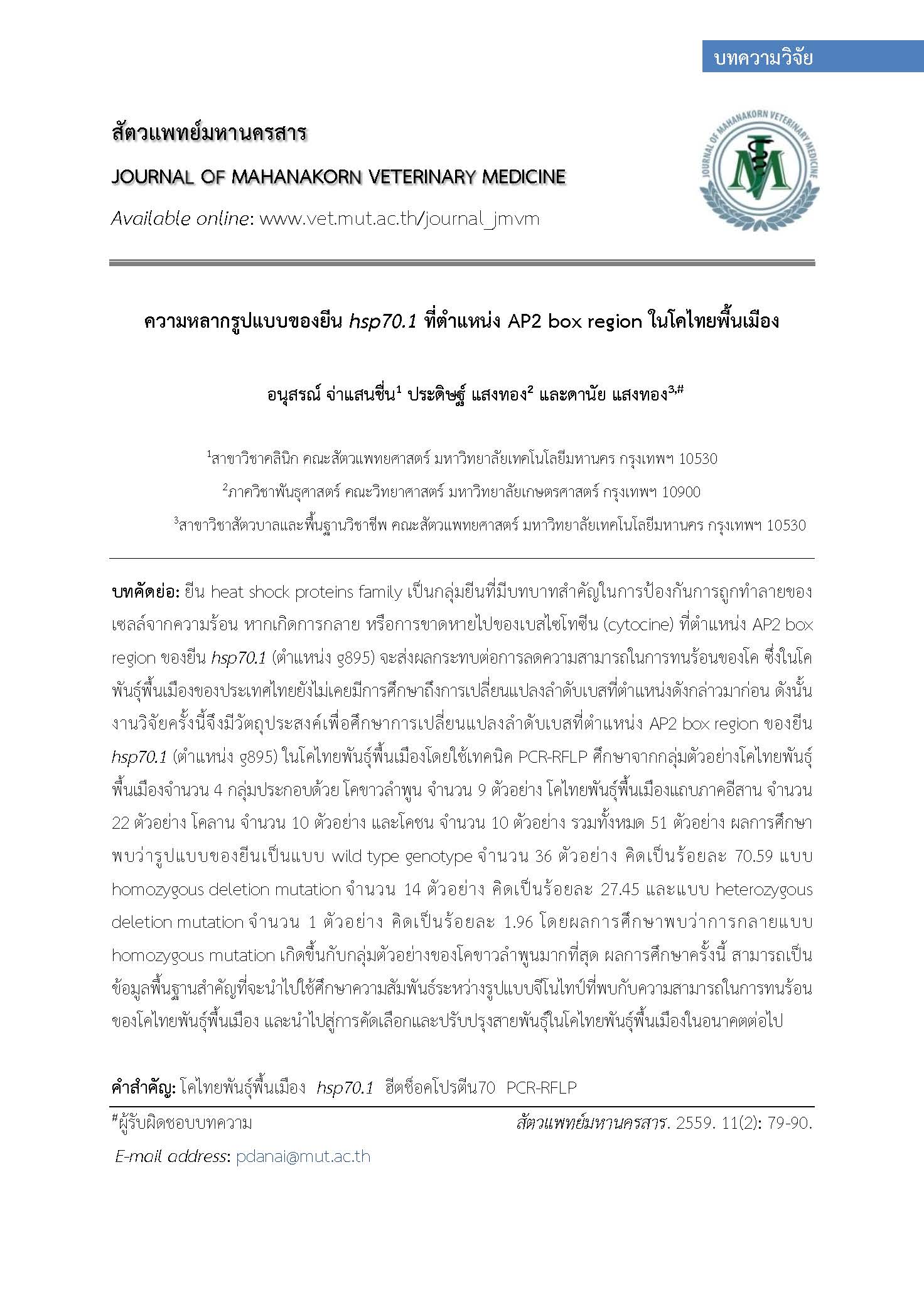The Polymorphism of Heat Shock Protein 70.1 (hsp70.1) Gene at AP2 Box Region in Thai Native Cattle
Main Article Content
Abstract
Heat shock proteins family (Hsp) is known to play a major role in the protection of cells from thermal stress. It is an important to protect cells from heat damage as well as to prevent protein denaturation and apoptosis. The genotypic variants of hsp70.1 gene in the AP2 box region, especially the deletion of cytosine base (base position g895) are associated to decrease cellular thermo-tolerance in cattle. In Thailand, There is no information to display the mutation of this gene in Thai native cattle. The aim of this study is to investigate the genotypic variation of hsp70.1 gene in the AP2 box region in Thai native cattle (at base position g895). To elucidate, we used DNA from 51 samples of Thai native cattle comprise 9, 22, 10 and 10 samples from 4 regions of Thailand composed of the North, North-East, Central region and the South, respectively. Double PCR-RFLP was used to identify the genotypes of hsp70.1 gene in theAP2 box region. Our results revealed that the wild type genotype was found in 70.59 % (n=36), homozygous mutation 27.45 % (n=14) and heterozygous mutation 1.96 % (n=1) respectively. Furthermore, The North region of Thailand is the most group of mutation. The result from this study may be useful to evaluate the correlation of thermo-tolerance and genotypic variation and useful for selection and improvement of Thai native cattle in the future.
Article Details
References
จักรกริช เจริญศิลป์ สุภร กตเวทิน ยุพินผาสุข และ สุรางคนา สุขเลิศ. 2555. การตอบสนองทางสรีรวิทยาและปริมาณ HSP70 ในเม็ดเลือดขาวของโคพื้นเมืองไทยต่อสภาพอากาศในรอบวัน. แก่นเกษตร. 40 ฉบับพิเศษ 2: 377-380.
พิชิต ชูเสน สุวิช บุญโปร่ง และ ชำนาญ ดงปาลี. 2553. แนวโน้มทางพันธุกรรมลักษณะความสมบูรณ์พันธุ์ของโคขาวลำพูน. E-Journal สำนักพัฒนาพันธุ์สัตว์ กรมปศุสัตว์. เข้าถึงได้จาก http://e-journal.dld.go.th/ ?p=642 (19/6/2559)
อุมาพร แพทย์ศาสตร์. 2548. ความหลากหลายของยีนฮีทช็อคโปรตีน 70 90 และยีนกลูโคคอร์ติคอยด์รีเซพเตอร์ในโคพื้นเมืองไทยและโคนมลูกผสม. วิทยานิพนธ์ ปริญญาวิทยาศาสตร์มหาบัณฑิต (เทคโนโลยีชีวภาพเกษตร). บัณฑิตวิทยาลัย มหาวิทยาลัยเกษตรศาสตร์. หน้า 81
Basirico, L., Morera, P., Primi, V., Lacetera, N. and Nardone, A. 2011. Cellular thermotolerance is associated with heat shock protein 70.1 genetic polymorphisms in Holstein lactation cows. Cell Stress Chaperon. 16: 441-448.
Beatty, D.T., Barnes, A., Taylor, E., Pethick, D., McCarthy, M. and Maloney, S.K., 2006. Physiological responses of Bostaurus and Bosindicus cattle to prolonged, Continuous heat and humidity. J. Anim. Sci. 84: 972-985.
Charoensook, R., Gatphayak, K., Sharifi, A.R., Chaisongkram, C., Brenig, B. and Knorr, C. 2012. Polymorphisms in the bovine HSP90AB1 gene are associated with heat tolerance in Thai indigenous cattle. Trop. Anim. Health Prod. 44: 921-928.
Chen, T., Guo, J., Han, C., Yang, M. and Cao, X. 2009. Heat shock protein 70, Released from heat stressed tumor cell, Initiates antitumor immunity by inducing tumor cell chemokine production and activating dendritic cells via TLR4 pathway. J. Immunol. 182: 1449-1459.
Deb, R., Sajjanar, B., Singh, U., Kumar, S., Brahmane, M.P., Singh, R., Sengar, G. and Sharma, A. 2013. Promoter variants at AP2 box region of hsp70.1 affect thermal stress response and milk production traits in Frieswal cross bred cattle. Gene. 532: 230-235.
Deb, R., Sajjanar, B., Singh, U., Kumar, S., Singh, R., Sengar, G. and Sharma A. 2014. Effect of heat stress on the expression profile of Hsp90 among Sahiwal (Bos indicus) and Frieswal (Bos indicus × Bos taurus) breed of cattle: A comparative study. Gene. 536: 435-440.
Hansen, P.J. 2004. Physiological and cellular adaptations of zebu cattle to thermal stress. Anim. Reprod. Sci. 82-83: 349-360.
Hartwell, L. H., Hood, L., Goldberg, M.L., Reynolds, A.E. and Silver, L.M. 2011. Genetics From Genes to Genomes. 4th edition. McGraw-Hill company. New York. 730 p.
Kregel, K.C. 2002. Molecular Biology of Thermoregulation Invited Review: Heat shock proteins: modifying factors in physiological stress responses and acquired thermotolerance. J. Appl. Physiol. 92: 2177-2186.
Matute, D.R. 2013. The role of founder effects on the evolution of reproductive isolation. J. Evol. Biol. 26(11): 2299-2331.
Ravagnolo, O., Misztal, I. and Hoogenboom, G. 2000. Genetic component of heat stress in dairy cattle, development of heat index function. J. Dairy Sci. 83: 2120-2125.
Rensis, F.D. and Scaramuzzi, R.J. 2003. Heat stress and seasonal effects on reproduction in the dairy cow: A review. Theriogenology. 60: 1139–1151.
Schwerin, M., Sanftleben, H. And Grupe, S. 2003. Genetic predisposition for productive life is associated with functional inactivation of a AP2-binding site in the promoter of the stress protein 70.1-encoding gene in cattle. Arch. Tierz. Dummerstorf. 46(2): 177-185.
Sonna, A. Larry, Fujita, J., Gaffin, L. Stephen, and Lilly, M. Craig. 2002. Invited review: Effects of heat and cold stress on mammalian gene expression. J. Appl. Physiol. 92: 1725–1742.
Xiong, Q., Chai, J., Xiong, H., Li, W., Huang, T., Liu, Y., Sua, X., Zhang, N., Li, X., Jiang, S. and Chen, M. 2012. Association analysis of HSP70A1A haplotypes with heat tolerance in Chinese Holstein cattle. Cell Stress Chaperon. 18: 711-718.


